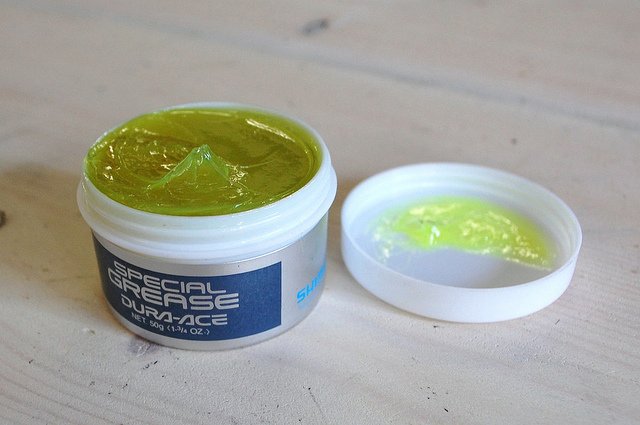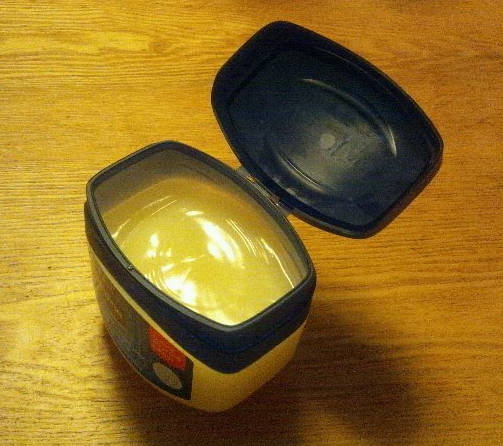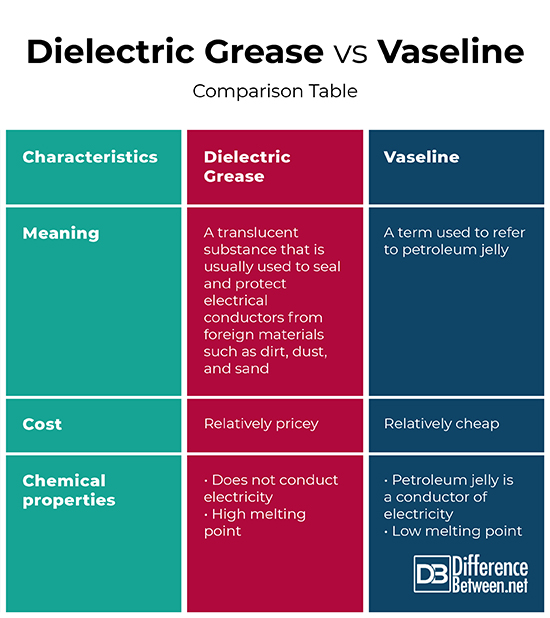Difference Between Dielectric Grease and Vaseline
Many a time, people ask questions on what they should use between dielectric grease and Vaseline for their motor vehicles, bikes, and motorcycles. Even though these two products are used mostly in the motor and electrical industries, they are different from each other. Each has its distinct qualities and characteristics that make it different from the other.
To draw the distinction line between the two, this post tries to bring out their characteristics and applications. The characteristics in return bring out the differences between them and might in the future help you avoid using the wrong one on your automotive engine or connectors.

What is Dielectric Grease?
Dielectric grease is an electrically insulating compound with multiple industrial uses. Its main uses in the electric and motor industries are attributed to its vast qualities that put it ahead of its peers. Since the grease doesn’t break down even when a high voltage is applied to it, it is a highly recommended compound for insulating electrical connectors.
These are connectors that mostly contain rubber gaskets. The dielectric grease is used to lubricate as well as seal the rubber portions of such connectors.

What is Vaseline?
The term vaseline is used in many languages to refer to petroleum jelly (grease). Apart from the multiple home uses, vaseline is also used for industrial purposes. In the industries, it is mainly used for moistening plasticine, coating items that are prone to corrosion, and finishing wood.
It is also used to condition leather, as a release agent for automotive, rubber, and general industrial areas. In addition, it is used for protecting and preventing moisture loss as well as a release agent used for castings and plaster molds.
Differences Between Dielectric Grease and Vaseline
The main differences between the two are:
-
Meaning of Dielectric Grease and Vaseline
Dielectric grease refers to a translucent substance that is mainly used to seal and protect electrical conductors against sand, dirt, dust, or other foreign materials. Vaseline, on the other hand, is a term used to refer to petroleum jelly.
-
Preservation Strength
On a comparison table, the dielectric grease is considered to be more superior than Vaseline when it comes to preserving connections. As such, petroleum jelly (or Vaseline) is weaker and would not last more than the dielectric grease when exposed to extreme temperatures.
-
Chemical Properties
Dielectric grease is not an electric conductor while anything soaked in petroleum jelly will burn if exposed to heat or an electric current.
Also, Vaseline has a very low melting point compared to the dielectric grease which can withstand extreme temperatures. This Vaseline property would make it to run and dry out eventually if exposed to any heat.
-
Cost of dielectric grease Vs. Vaseline
The dielectric grease is relatively expensive while Vaseline is relatively cheap.
Dielectric Grease Vs. Vaseline: Comparison Table

Summary of Dielectric Grease Vs. Vaseline
Quite often, people have used both vaseline and dielectric grease on their automotive. They might have never noticed any difference but an expert in the industry would tell whether they made a mistake. The expert would also tell them what would work on an electric conductor and which will wear out any rubber covering. As an automotive owner, it would be advisable to seek advise from industrial experts before applying the wrong substance and ruining everything in the process.
- Difference Between Minecraft and Terraria - August 7, 2020
- Difference Between Alliteration and Onomatopoeia Poems - July 25, 2019
- Difference Between Certification and Licensure - July 24, 2019
Search DifferenceBetween.net :
 Email This Post
: If you like this article or our site. Please spread the word. Share it with your friends/family.
Email This Post
: If you like this article or our site. Please spread the word. Share it with your friends/family.
4 Comments
Leave a Response
References :
[0]"Dielectric Grease Vs Conductive Grease". W8ji.Com, 2019, https://www.w8ji.com/dielectric_grease_vs_conductive_grease.htm.
[1]"Petroleum Jelly Industrial Grade". Atdmco.Com, 2019, https://atdmco.com/wax/petroleum-jelly/industrial.html.
[2]Image credit: https://commons.wikimedia.org/wiki/File:Vaseline_Opened.jpg
[3]Image credit: https://www.flickr.com/photos/glorycycles/6896140726


You are mistaken. Vaseline does not conduct electricity to any measurable degree. Both dielectric grease and are nonconductors. You also say things that make no sense, like “Dielectric grease is not an electric conductor while anything soaked in petroleum jelly will burn”.
This article is so riddled with non sequiturs that it casts doubt on the website in toto.
All I can say that if your having a myocardial infarction “heart attack” the paramedics that will save your life will use a heart defibrillator to jump start your heart and in the process will apply Vaseline on the paddles for good electrical conductivity without burning your chest…..article makes no sense regarding Vaseline. I think both dielectric grease and Vaseline have good electrical conductivity unless you prove me wrong.
When you consider all the “non-conductive tissue”, or highly resistant tissue the electrical impulse goes thru, some petroleum jelly is not significant.